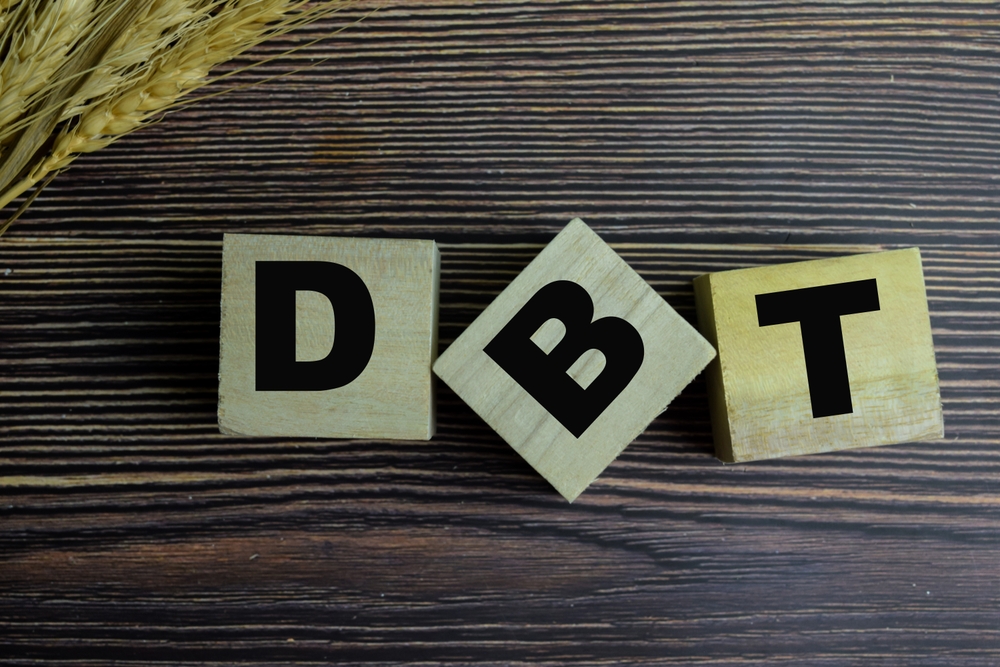Last Updated:
October 1st, 2025

There are many models of therapy used to support the addiction recovery process, complete with their own unique areas of focus. DBT is one such therapeutic model with life-changing capabilities.
Therapy used in recovery can help you learn to build the house of tomorrow with the bricks of today. This article outlines the efficacy of DBT used in recovery and will support your complete recovery for a brighter, sober tomorrow.
What is DBT, and why is it used in addiction recovery?
As a person goes through the recovery process, there are battles for both the body and mind. Typically, the physical side of recovery comes first, with medical detox to help you manage physical withdrawal symptoms as the substance leaves your body. For most people, this is only half the battle.
The psychological stresses in recovery can become like a war raging in your mind. Mental withdrawal symptoms like stress and cravings can function like a poisonous trap, lulling you into the temptation of relapse. This is what makes therapy programmes so important to the recovery process. Many therapy types and modalities can be used to support your mental state, with Dialectical Behaviour Therapy (DBT) being one of the most well-researched and effective models for addiction recovery.
DBT is broadly categorised as “talk therapy.” It is primarily based on cognitive behavioural therapy but is specially adapted for people who feel emotions very intensely.
At the core of DBT lie two seemingly opposite yet harmonious concepts: acceptance and change. The balance between these two forces can be especially helpful for people in addiction recovery, where a person comes to terms with where they are in life while working towards a healthier future. Some expert therapists and behavioural psychologists highlight DBT’s deeper integration of “acceptance strategies” to process the emotional turbulence experienced yesterday but felt today.
If you’re navigating sobriety and the temptation of relapse, DBT can become a boundless wellspring of mental support, making sure you gain control and create lasting change.
Outlining and exploring the four pillars of DBT
If you have spent a long time addicted to a substance, you may have come to accept intoxication as the normal state in which you operate on a day-to-day basis. Newfound sobriety can feel bewildering, so therapy needs to create a stable, solid mental landscape for you to navigate soberly. DBT conceptualises “four pillars” that provide this stability. Here, we’ll look at the importance of all four and how they can become the terra firma of your recovery journey:
1. Mindfulness
In one corner of the DBT quadrant lies the practice of mindfulness. It involves tuning into the present moment with intention and without judgement. For a person in addiction recovery, this means learning to pause, observe emotions and thoughts, and then respond thoughtfully. Mindfulness is simple, in theory, allowing a person to avoid impulsive reactions and fall back into familiar yet destructive patterns.
Mindfulness becomes a sharp tool for carving out a life free from cravings and emotional triggers. Within DBT, mindfulness helps a person to stop avoiding or suppressing troubling feelings. Instead, a person learns to sit with these feelings, strengthening the ability to stay grounded during stress.
Mindfulness doesn’t need hours of meditation or a perfect state of calm. It is a functional practice for day-to-day living. Breathwork exercises and emotion labelling strengthen the defence against urges, opening the door to long-term healing.
2. Distress tolerance
Another integral pillar in the foundation of the DBT model is your tolerance for distress or emotional resilience. For a person in the battle of addiction recovery, this is vital for multiple reasons. Before treatment, distressing situations often drive a person to coping strategies that only lead to self-destruction in the long run. Drinking, using drugs, lashing out, or shutting down rarely ever solves a deep problem. DBT understands this and offers more proactive alternatives.
This pillar teaches you how painful moments shouldn’t be combated with substance use. Through conscious drills, you can learn to acknowledge emotional pain without being consumed by it.
DBT doesn’t try to deny or eliminate distress entirely; instead, it helps you build resilience by riding the wave. In the same way, distress can feel like a surging tide that stretches your entire horizon. DBT can help you learn to float, swim and find a steady shore as the waves continue to swell.
3. Emotional regulation
Similarly to distress tolerance, emotional regulation can become a cornerstone of healing in recovery. Addiction is known to thrive in silence and fester in emotional extremes. The ability to regulate your emotions can be the difference between an emotional outburst and a careful, productive response. Emotional regulation in DBT is in place for you to recognise emotional patterns and reduce your vulnerability to mood swings.
DBT uses this pillar to delve deeper into physical practices like stronger sleeping and nutritional habits. Your physical health positively contributes to stronger mental health as you develop strategies to stop emotions from escalating into crises.
4. Interpersonal effectiveness
The fourth pillar of DBT in recovery helps a person to understand how their emotions can be carried into their personal relationships. This aspect highlights the importance of distance and boundary setting, both integral parts of prolonged sobriety.
A person’s interpersonal effectiveness keeps them on the safe side of temptation and deepening urges, learning to say no when it’s necessary. This pillar develops the ability to remove guilt from daily interactions, which can be a powerful skill for those battling addiction. Too often, a person succumbs to people-pleasing or avoidance of healthy coping mechanisms simply because they do not value themselves highly enough. Developing your interpersonal effectiveness makes it easier to feel uplifted when you make the right decisions around other people rather than undermining the progress you’ve made.
Is DBT right for everyone?
Dialectical Behaviour Therapy can become like a sculptor’s chiselling tool that helps transform raw rock into an astounding sculpture. Yet, like any process that can fundamentally change a person’s life, it may not be best suited for everyone.
Expert therapists understand the intricacies of each therapy modality. They will look at a person’s history and deeply understand which therapy is most suited for their recovery programme. Some people may benefit more from another system, such as motivational interviewing or trauma-focused therapy. The key to effective treatment comes from finding which modality most suits your needs and your readiness for change.
If we are to quantify the effectiveness or success of DBT, we should understand that it is often measured by reductions in harmful behaviours, symptom severity and improvements in quality of life. Research shows that DBT may be especially effective for people with co-occurring mental disorders, such as depression, anxiety or borderline personality disorder (BPD.) 88% of patients with BPD experience a decrease in symptoms after going through a DBT course, with three-quarters of them no longer meeting the diagnostic criteria for BPD once the course is complete.
If it sounds like it would suit you, it may become the cornerstone of your successful recovery, and you should begin the conversation with a professional.
Where can I find DBT in addiction treatment programmes?
If dialectical behaviour therapy is the right path for you or a loved one, the first step is to find a treatment centre that understands its core tenets and application. At UKAT, our rehab programmes are designed to support your sobriety, complete recovery, and emotional resilience.
Whether you’re dealing with addiction alone or alongside other mental health struggles, our expert team is here to support your full healing process. You don’t need to have all the answers right now, just a willingness to reach out for the support and care you deserve.
Contact us today for the first step on the journey to complete recovery.
(Click here to see works cited)
- Hofmann SG, Sawyer AT, Fang A. The empirical status of the “new wave” of cognitive behavioral therapy. Psychiatr Clin North Am. 2010 Sep;33(3):701-10. doi: 10.1016/j.psc.2010.04.006. PMID: 20599141; PMCID: PMC2898899.
- Hylland, Kelsey. “Stats around DBT: Evidence, Success Rates, and Impact – DBT-UK.” DBT, 3 Oct. 2024, dbt-uk.com/stats-around-dbt-evidence-success-rates-and-impact/.




